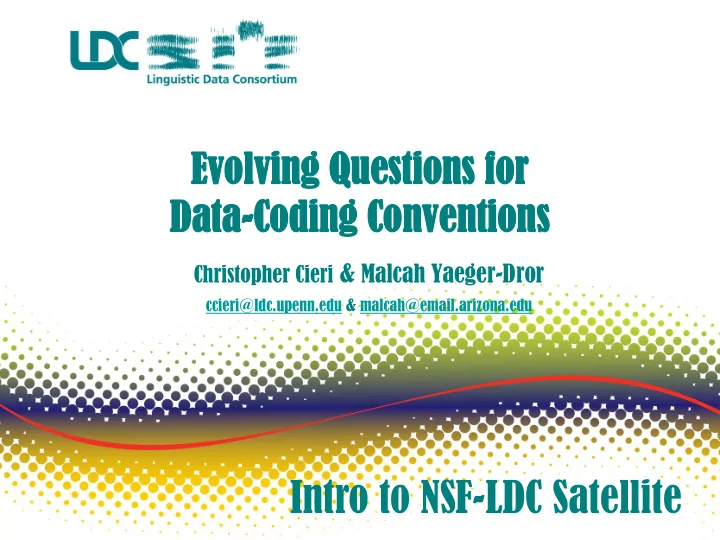

Evol volving ving Qu Ques estions tions fo for Data Da ta-Coding Coding Co Convention nventions Christopher Cieri & Malcah Yaeger-Dror ccieri@ldc.upenn.edu & malcah@email.arizona.edu Intro to NSF-LDC Satellite
Th Three ee Co Coding ding Fo Foci ci Today‘s main foci – Ethics ics Dem emog ographic raphic coding: ding: has been upgraded constantly to reflect linguists‘ needs, but there are recurring problems where we under-differentiate. Attitude coding: towards one‘s own and others‘ groups Tomorrow‘s main focus Social Situation — interaction among speakers‘ demographics Drawing some conclusions NSF-LDC Workshop on Archival Preparation, LSA 2012 Portland 6
Et Ethi hical cal Re Revi view ew Given that the questions we ask set the IV mood that insufficient information precludes sharing that often there are difficulties getting permission A few do‘s and don‘ts of ethical review board interaction Natasha Warner – LSA‘s ethics panel Denise DiPersio —LDC‘s ethics proposal writer NSF-LDC Workshop on Archival Preparation LSA 2012, Portland. 7
Co Codi ding ng : : Labov‘s Ru Rule e #1 #1 Use more distinctions than you need! It is easier to merge groups later Than to recode from scratch. You can‘t put back what you didn‘t code… You can‘t compare if the features aren‘t there to compare – ―Pollock/Hinton effect‖ So, even if there were little evidence for the importance of X in Y community, but more evidence for its importance in Z community: do it! NSF-LDC Workshop on Archival Preparation LSA 2012, Portland. 8
Th Three ee Co Coding ding Fo Foci ci Today‘s main focus – De Demographic mographic coding: ding: has been upgraded constantly to reflect linguists‘ needs, but there are recurring problems where we under-differentiate. *EMPHASIZING* The speaker‘s expertise Research design adapted to permit sharing. NSF-LDC Workshop LSA 2012, Portland. 9
Dem emogr ographics aphics Region ion Sex (M/F) Racial ial or He Herit itage age group(s) Years of education Age Age -- NSF-LDC Workshop on Archival Preparation: LSA Portland 2012 10
Dem emogr ographics aphics So Soci cioe oecono conomic ic background/place within the society {SES ML…} Sexuality--Eckert Racial cial or r Her eritage itage group(s) {how far back? How mixed? How strongly identified?} Black ck – Blake ke Hispanic panic — Fought Fought Asian ian — Wong/Hall Wong/Hall-Le Lew Age Age – Bowie Rel elig igious ious affiliation--Bowie NSF-LDC Workshop on Archival Preparation: LSA Portland 2012 11
Egyp gypt: t: Co Copt pts, s, vs vs . Br Broth ther erhood hood Haeri/Royale/Miller 12 NSF-LDC Workshop on Archival Preparation: LSA Portland 2012
ligion a La Re Religion Lang nguage uage The province of historical linguists or social psychologists Blanc‘s work in the 60‘s Bagdad – entirely based on religion, with sociophonetic distinctions. Milroy‘s work in the 70‘s Belfast Giles‘ early work in the - 70‘s Belgian [French/Catholic] vs. Flemish [Dutch/Protestant] Quebecois [French/Catholic] vs. Anglophone [Protestant] More recent work on ‗language and religion‘ in the Near East /q, r , …./ varies with religion/ or degree of religiosity. More recent work on ‗degree of religiosity‘ in the US 13 NSF-LDC Workshop on Archival Preparation: LSA Portland 2012
Atti ttitu tudes des Today‘s main foci – De Demographic mographic coding ding Attitude coding : towards one‘s own and others‘ groups Llamas – North of England Nagy, Hoffman – Toronto Noels — conceptual Poplack--Sociolinguistic importance of attitudes Tomorrow‘s main focus Social Situation-- Attitude Coding: attitudes towards one‘s own and others‘ group NSF-LDC Workshop on Archival Preparation LSA 2012 Portland. 14
Social cial Situa tuation tion Social Situation — Tagliamonte Rickford The interlocutors, and the relationship between them The ovehearers – ratified and not. (Bell) Taking advantage of ‗serendipitous situational switching‘ Place Llamas Interaction of demographics among interlocutors Interaction of degree of commitment to each other or outsiders (Bell) Discussion of how to archive factors Interaction between interlocutors‘ demographics Attitudes towards ones own and interlocutors ‘ demographics NSF-LDC Workshop on Archival Preparation LSA 2012 Portland. 15
Archival necessities… Whateve ever r gro roups ps we e have e they ey should uld all ll be rep e represe resented nted We e want t to sugges ggest t ways ys in which ch we can accommod ommodate ate our coding ding conventions ventions to new insig ights hts about ut Spea eaker ker demog mogra raphics phics Speakers‘ attitudes the influence luence of social cial attitude tudes s on self lf-ident identifi ifica cation ion. As s well l as our r need ed to attend end to va variab iability lity in self lf-identification identification persp rspectives, ectives, eve ven n when en inter eracting acting with h a single ngle inter erlocutor locutor. Thes ese e talk lks s focus us on possi sible ble ways s to det eter ermine mine thes ese e factors, tors, And how bes est to unify y our r coding ding pro rotocol tocols to per ermit mit us to share re data a among ong ours rsel elves ves 16
Thanks to NSF & LDC for funding
Recommend
More recommend